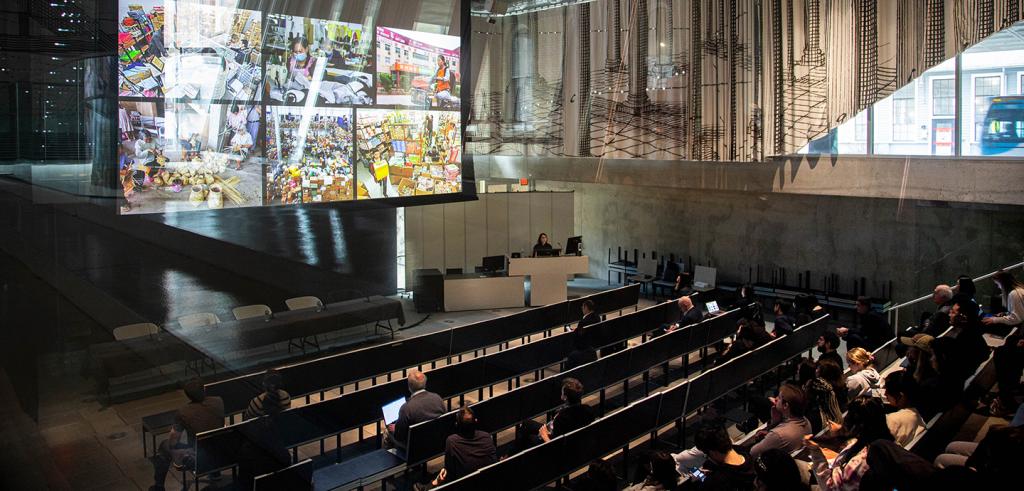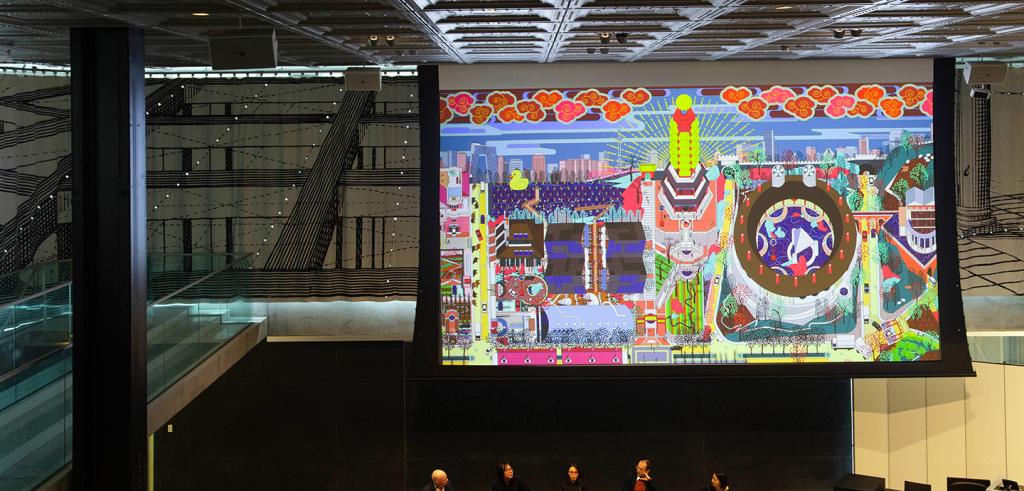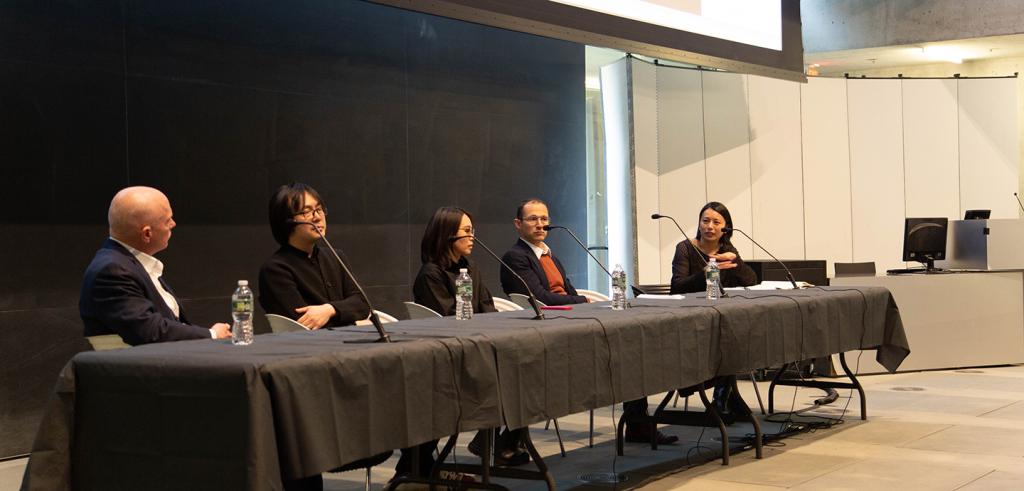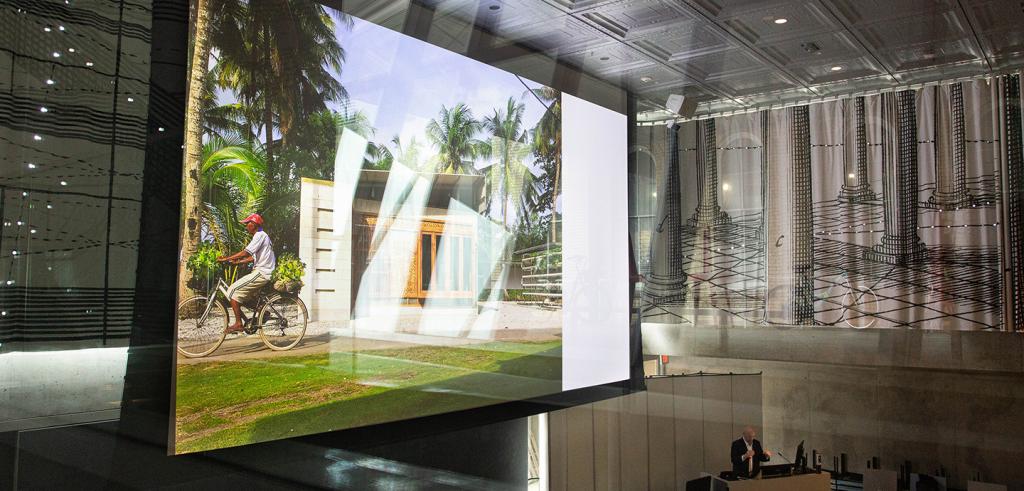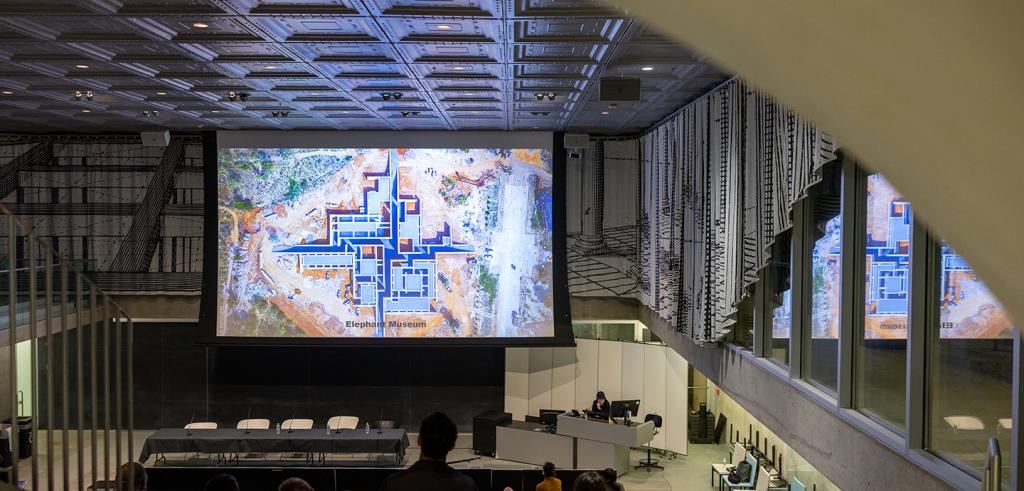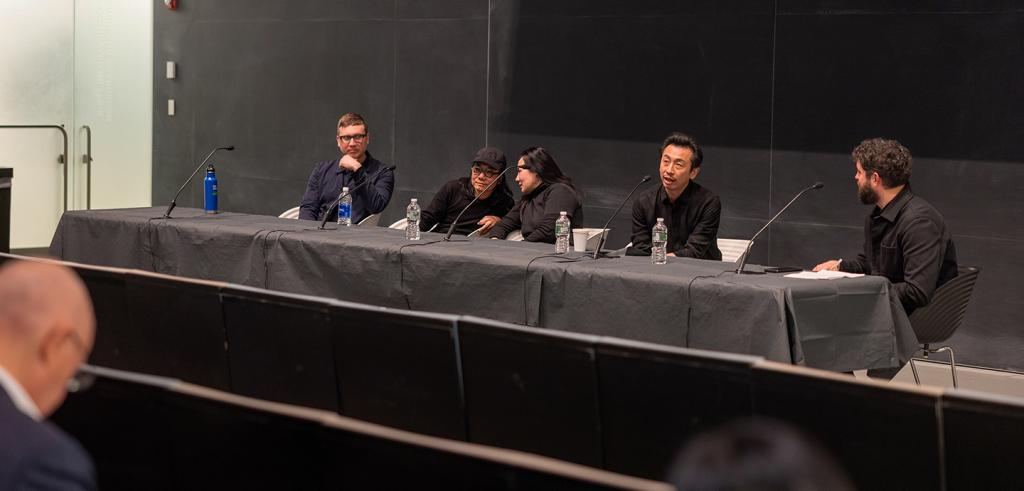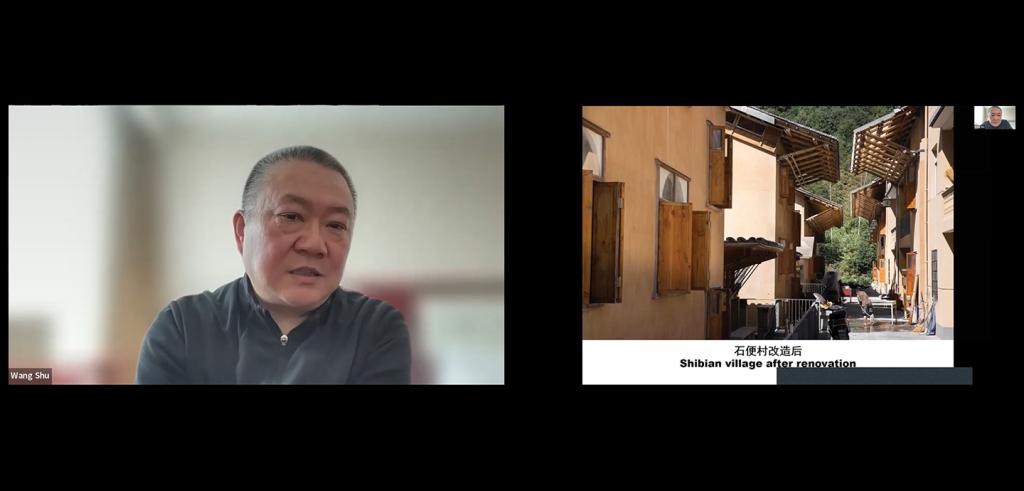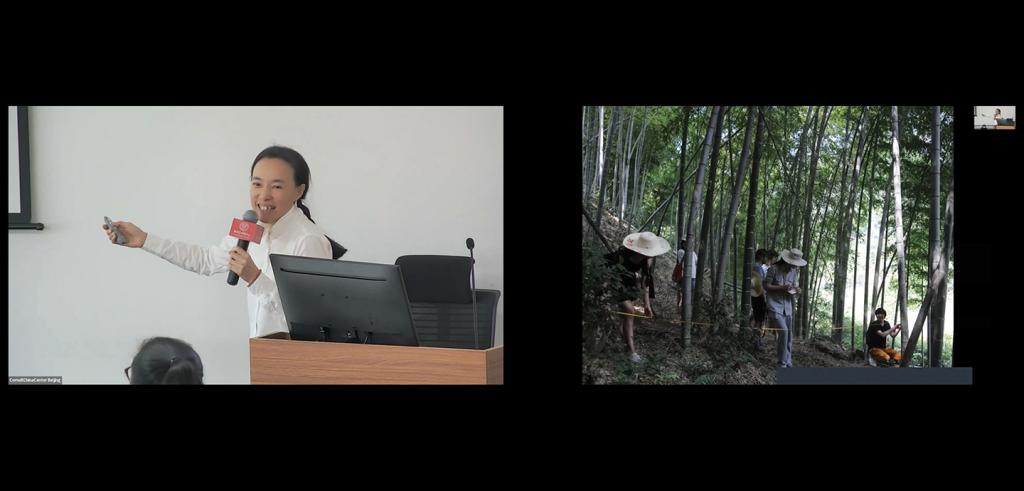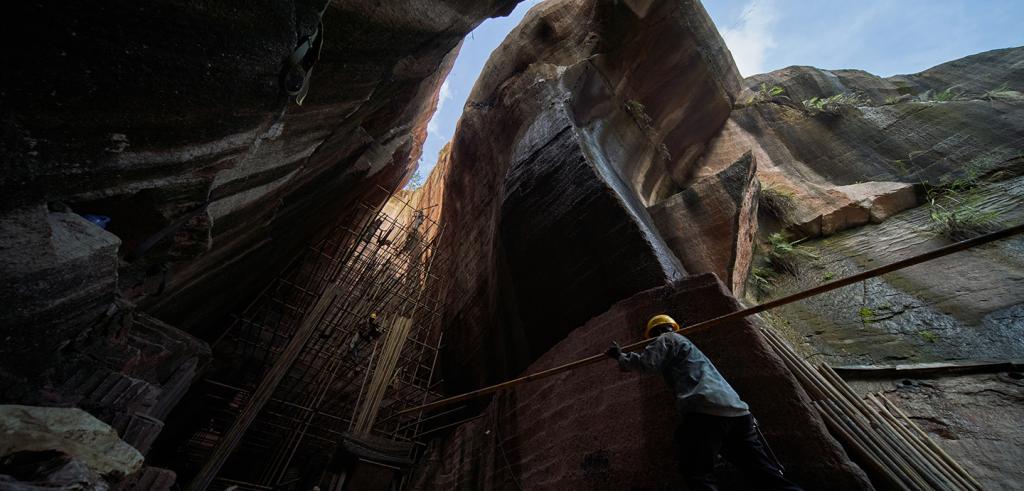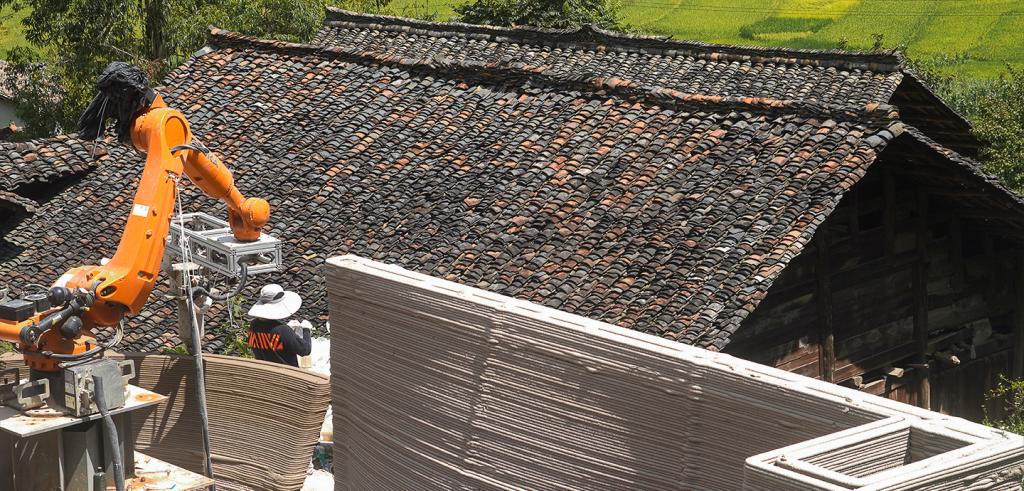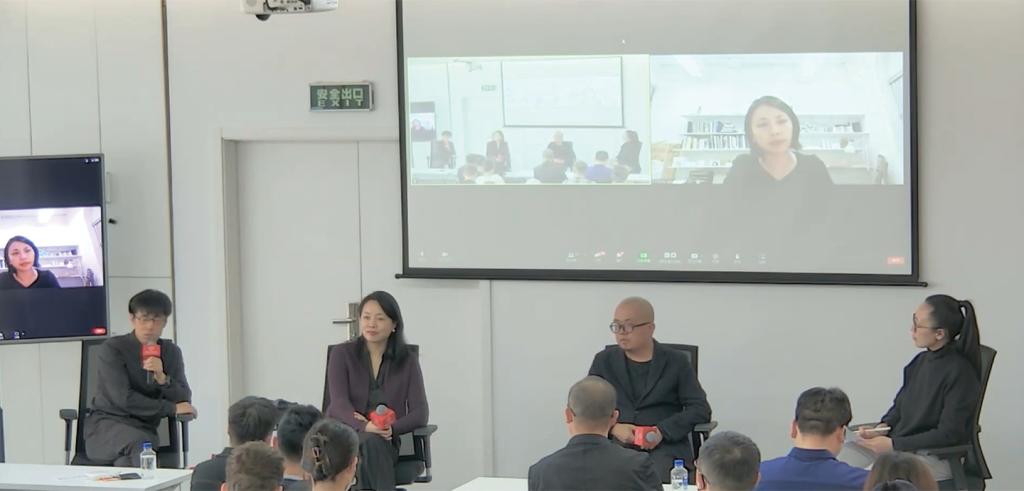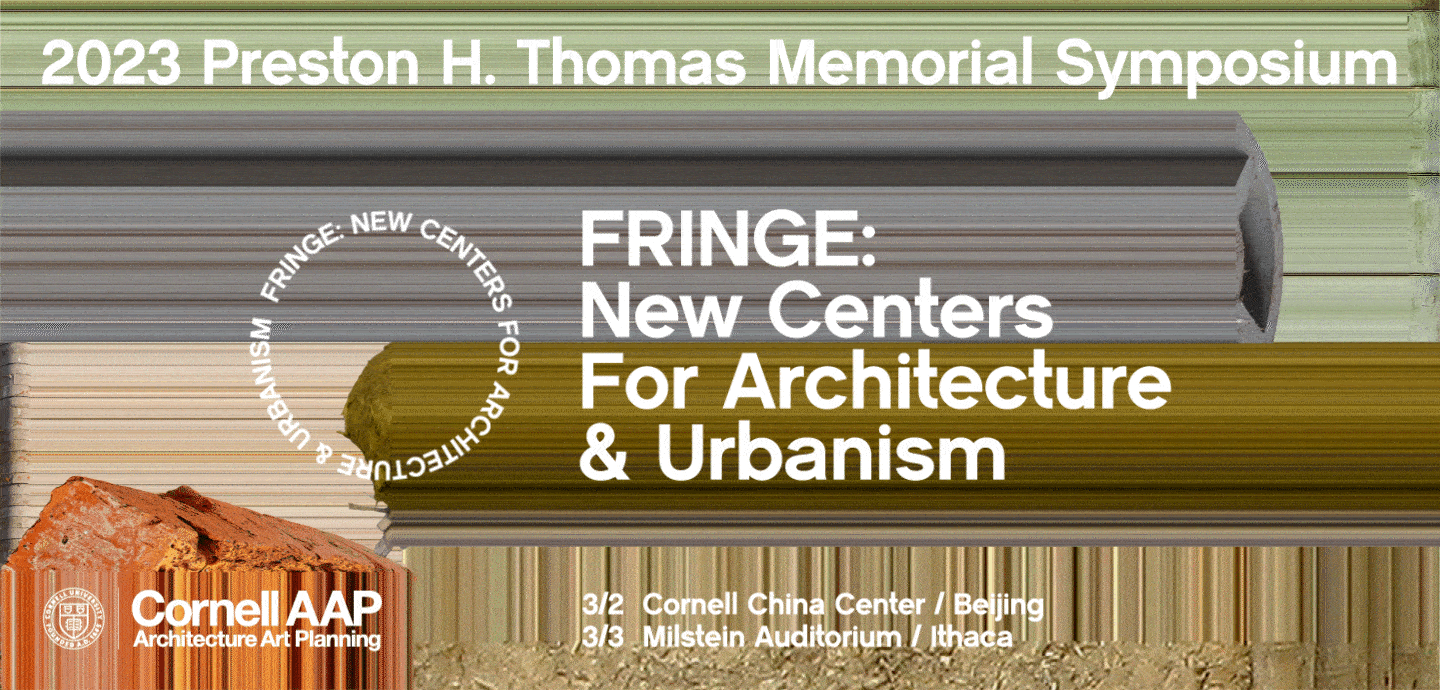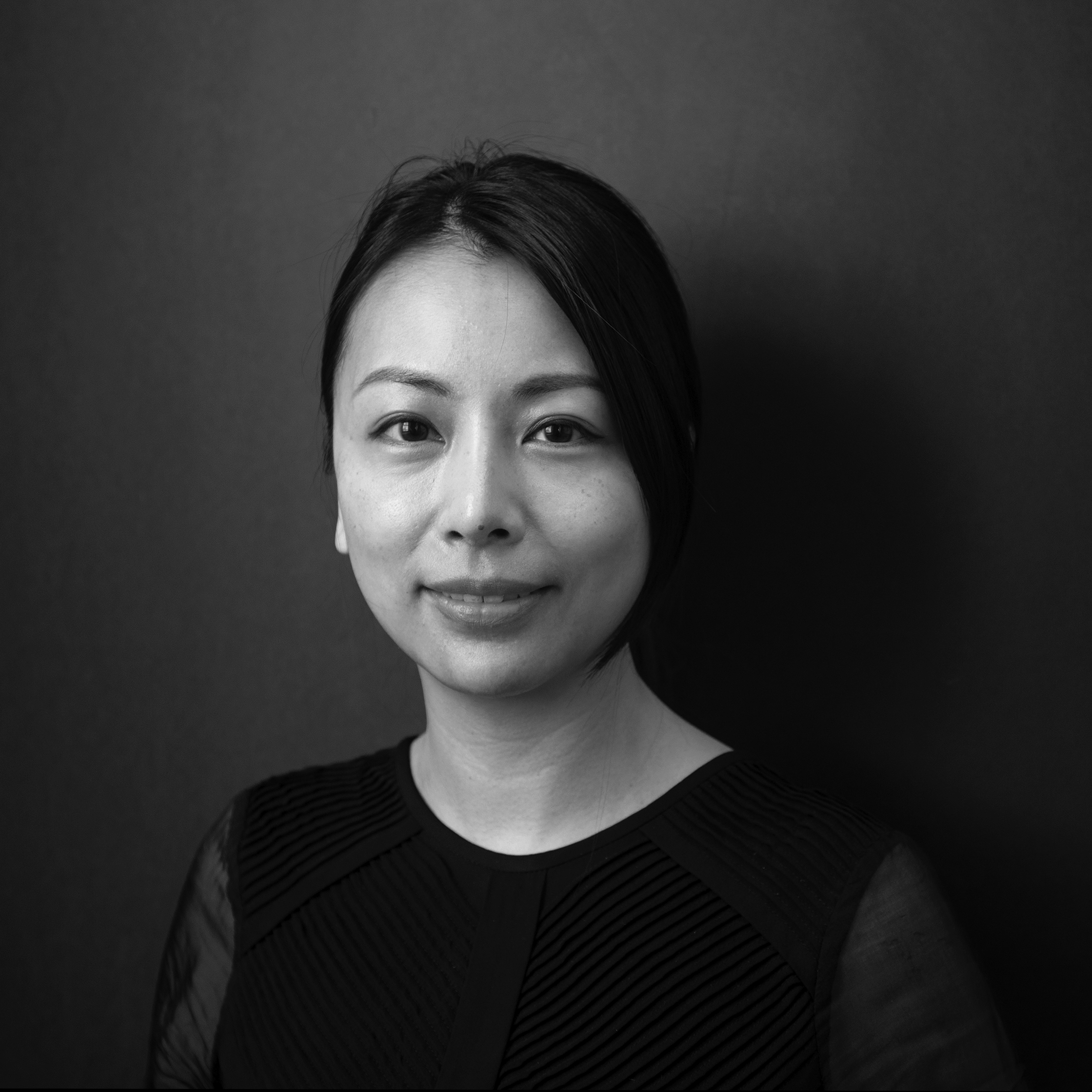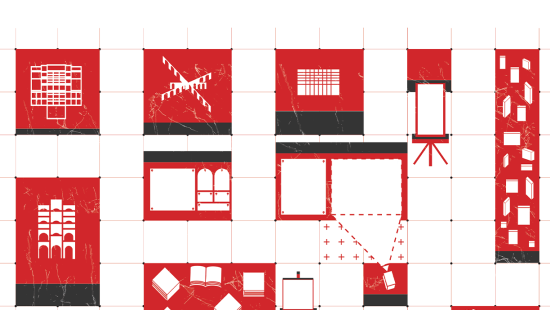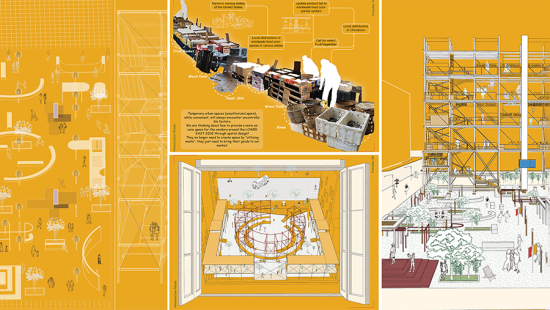Preston H. Thomas Memorial Symposium: FRINGE
Overview
FRINGE: New Centers for Architecture & Urbanism
The FRINGE is an ambiguous and ubiquitous patchwork of zones that form a wide range of territorial landscapes which can be characterized as neither distinctly urban nor distinctly rural. Driven by narratives of unrelenting and perpetual urbanization, the FRINGE constitutes the global engine for rural transformation and urban growth, a site for extractive industries, a territory for agricultural and technological production, and a continuous land supply for architectural development and the expansion of urbanites. Formerly understood as peripheral, these multivalent rural-urban zones constitute new conceptual centers for architecture and urbanism. Redefining architectural agency across scales, FRINGE innovations range from state-of-the-art and adaptive material usage in construction to the development of atypical spatial morphologies and programmatic adjacencies.
Containing some of the world's most intensely altered rural-urban contexts, East and Southeast Asia provide a fertile seedbed for research on global FRINGE architecture and urbanism. Bringing together innovative design and research through the lens of the built environment, this symposium questions: How do the material and technological changes brought about by urbanization collide with the spatial, cultural, and social practices of the rural? How do such meetings create or alter the special conditions of agency and interconnection, from the digital to the traditional, from the informal to the infrastructural, within the rural-urban?
Kicking off with a keynote address and the first panel in Beijing on March 2 (cohosted with the Cornell China Center), the symposium will continue with a second and third panel in Milstein Hall in Ithaca on March 3. An accompanying exhibition will be on view in the Bibliowicz Family Gallery from Feb 28 to March 23. The symposium and this accompanying exhibition aim to unpack the FRINGE's spatial, ecological, and technological capacities to reveal innovative, flexible, and contextual design strategies that strive to be environmentally conscious, socially equitable, and architecturally adaptive.
The Preston H. Thomas series is funded through a gift to Cornell's College of Architecture, Art, and Planning from Ruth and Leonard B. Thomas of Auburn, New York, in memory of their son, Preston. The symposium events are free and open to the public.
The Symposium's Beijing Panel is co-hosted and co-sponsored by the support of the Cornell China Center and in collaboration with Associate Professor Ying Hua, Nina Trautmann Chaopricha, and Peter Wen.
Organized by Assistant Professor Leslie Lok, coordinated by Design Teaching Fellow Hanxi Wang (B.Arch. '18). Exhibition assistance by Sophia Chen (B.Arch. '23), Jialiang (Hunter) Huang (M.Arch. '24), and Cynthia Kuo (M.Arch. '24); Augmented Reality interface by Yichen Jia (B.Arch. '18).
Schedule
Beijing Panel — Thursday, March 2 (Ithaca) | Friday, March 3 (Beijing)
In-Person & Livestream Webinar
Cornell China Center | 康奈尔中国中心
1208 Beijing IFC Tower B | 北京国际财源中心B楼 1208
8 p.m. (Ithaca) | 9 a.m. (Beijing)
Opening Remarks and Introduction:
Leslie Lok, Assistant Professor
8:15 p.m. (Ithaca) | 9:15 a.m. (Beijing)
Keynote Address: Lu Wenyu & Wang Shu, Amateur Architecture Studio
RURAL ITERATIONS
9:15 p.m. (Ithaca) | 10:15 a.m. (Beijing)
Speakers:
Xu Tiantian, DnA Design and Architecture
Song Yehao, SUP Atelier
Song Gang, Atelier cnS
Moderator:
Ying Hua, Director of Cornell China Center
Ithaca Panels — Friday, March 3
In-Person & Livestream Webinar
2 p.m. | TECHNOLOGICAL RURAL-URBAN
Abby and Howard Milstein Auditorium
Speakers:
Joshua Bolchover, Rural Urban Framework & The University of Hong Kong
Stephen Cairns, Future Cities Laboratory, ETH Zurich
Li Han & Hu Yan, Drawing Architecture Studio
Moderators:
Leslie Lok, Assistant Professor
4 p.m. | Coffee Break
Milstein Hall Dome
4:25 p.m. | EXPERIMENTAL RURAL-URBAN
Abby and Howard Milstein Auditorium
Speakers:
Curt Gambetta, Visiting Critic, Cornell University
John Lin, Rural Urban Framework & The University of Hong Kong
Boonserm Premthada, Bangkok Project Studio
Moderators:
David Costanza, Assitant Professor
6:30 p.m. | Reception and Exhibition Opening
Milstein Hall Dome
Speakers
Beijing Panel

Lu Wenyu
Amateur Architecture Studio
Lu Wenyu cofounded Amateur Architecture Studio in Hangzhou, China with Wang Shu in 1997, having studied architecture at Nanjing Institute of Technology. She is one of the founders and currently tutors in the architecture department at the China Academy of Art. Lu received the 2019 Gold Medal of Tau Sigma Delta and is the juror of UNESCO Asia-Pacific Awards for Cultural Heritage Conservation. She was awarded the Schelling Architecture Prize in Germany, the Honorary Award from the Venice Biennale in 2010, and listed among the RIBA 2015 Fellowships. Amateur Architecture received one of architecture's highest accolades, being awarded the Pritzker Prize in 2012.
Amateur Architecture Studio references the approach an amateur builder takes, incorporating spontaneity, craft skills, and cultural traditions. The firm utilizes knowledge of everyday techniques to adapt and transform materials for contemporary projects. This unique combination of traditional understanding, experimental building tactics, and intensive research defines the basis for the studio's architectural projects.

Wang Shu
Amateur Architecture Studio
Wang Shu won the Pritzker Architecture Prize in 2012. He believes very strongly in sustainable architecture and building in a way that is suited to less privileged communities — one of his latest projects involves persuading a Communist Party secretary in a village near Hangzhou not to tear down the dwellings but to renovate using the original tiles and bricks. He and his wife, Lu Wenyu, founded the Amateur Architecture Studio in 1997 in Hangzhou, China. The office name references the approach an amateur builder takes — one based on spontaneity, craft skills, and cultural traditions. Wang Shu is Professor and Head of the Architecture School at the China Academy of Art, Hangzhou. In 2011, he became the first Chinese Kenzo Tange Visiting Professor at the Harvard Graduate School of Design in Cambridge, Massachusetts, in the same year he received the Gold Medal of Architecture (grande médaille d'or) from the Académie d'Architecture of France.

Song Gang
Atelier cnS
Song Gang (M.Arch. '13) is a cofounder of Atelier cnS. Through his practice, Song Gang has completed urban and rural renewal projects across China, including projects in historical districts, industrial renovations, and public and arts buildings. The work of Atelier cnS promotes the regeneration of old buildings and the use of traditional materials in a modern context to meet current user needs. With experience from exhibition and art planning to creative architectural design, Song Gang is currently teaching at South China University of Technology.

Song Yehao
SUP Atelier
Song Yehao is a tenured professor and director of the Institute of Architecture and Technology at Tsinghua University's School of Architecture. Song has focused on sustainable theory and design for more than 20 years — within the scope of architecture, urban studies, and building technology — while promoting the combination of modern design and vernacular architecture in China. He is among the leading academics in sustainable architecture in China and a key government consultant. He is also the deputy chief architect of THAD, cofounder and principal of SUP Atelier, director of Green Building Theory and Practice Group at the China Green Building Council, director of the architectural branch and vice chairman of the Active House Academic Committee at the Architectural Society of China, and a member of the Architectural Design Professional Committee of the Ministry of Housing and Urban-Rural Development.

Xu Tiantian
DnA Design and Architecture
Xu Tiantian is the founding principal of DnA _Design and Architecture. She has received numerous awards such as the Moira Gemmill Prize for Emerging Architecture in 2019, the 14th International Prize for Sustainable Architecture Gold Medal, the 2022 Swiss Architectural Award, and the 2023 Berlin Kunstpreis. In 2020, she was appointed an Honorary Fellow of the American Institute of Architects. Xu Tiantian has engaged extensively in the rural revitalizing process in China. Her groundbreaking "architectural acupuncture" is a holistic approach to the social and economic revitalization of rural China and has been selected by UN Habitat as a case study included in their Compendium of Inspiring Practices on Urban-Rural Linkages. Xu Tiantian received her Master of Architecture in Urban Design (M.S. AUD) from the Harvard Graduate School of Design and her Baccalaureate in Architecture from Tsinghua University in Beijing.
Ithaca Panel

Joshua Bolchover
Rural Urban Framework & The University of Hong Kong
Joshua Bolchover is an architect and Professor at The University of Hong Kong. His work focuses on innovating design strategies in developing regions undergoing rapid urbanization. He started a new enterprise in 2020 — District Development Unit — to scale initiatives designed to change how developing regions grow. He has written three books, Becoming Urban: the Mongolian City of Nomads (2023), Border Ecologies: Hong Kong's Mainland Frontier (2017), and Rural Urban Framework: Transforming the Chinese Countryside (2014). He set up Rural Urban Framework with John Lin in 2005 with the remit to create a not-for-profit agency as a platform for design and research. Their projects have received international awards and have been exhibited globally. In recognition of Rural Urban Framework's contribution to architectural discourse, their work has been acquired by MOMA, New York (2020) and the CCA Archive (2020).

Stephen Cairns
Monash Indonesia / Future Cities Lab, ETH Zurich
Stephen Cairns is Professor of Urban Design at Monash University Indonesia and Principal Investigator of Agropolitan Territories at Future Cities Lab, ETH Zurich. His current work is focused on the complex patterns of settlement emerging in the predominantly rice-growing hinterlands of many large cities in Monsoon Asia. His practice-oriented research projects include the "expandable house" and "agropolitan seed town". His books include Buildings Must Die: A Perverse View of Architecture, coauthored with Jane M. Jacobs (MIT Press 2017) and the Future Cities Lab Indicia series (vols 1-3), coedited with Devisari Tunas (Lars Müller Press 2017, 2019, 2022).

Curt Gambetta
Cornell University
Curt Gambetta is an architectural designer and historian with research interests in the history and politics of building materials, fieldwork in architecture, the spatial politics of waste, and modern South Asia. He is a Ph.D. candidate in the History and Theory of Architecture and Urbanism at Princeton University, where he is completing his dissertation about the history of material substitutes in postcolonial India. He was the Peter Reyner Banham Fellow at the University at Buffalo School of Architecture and Planning (2011–2012) and a teaching fellow at Woodbury University in Los Angeles (2012–2013).

Li Han & Hu Yan
Drawing Architecture Studio
Established in 2013 by Li Han and Hu Yan in Beijing, Drawing Architecture Studio (DAS) explores the possibilities of drawing, space, and urban studies in a unique way. They use engineering drawing software as a tool and derive inspiration from architecture, art, popular culture, and daily life to create magnificent and complex images of urban landscapes. DAS has exhibited widely in China and abroad, including the 4th Chicago Architecture Biennial, the Chinese and Japanese pavilions of the 16th Venice Architecture Biennale, the 7th and 9th Shenzhen/Hong Kong Bi-City Biennale of Urbanism/Architecture, and many others. Their works were the winning pieces of the World Architecture Festival's Architecture Drawing Prize in 2018 and the RIBA Journal's Eye Line Drawing Competition in 2016, and they are also in the permanent collections of the Museum of Modern Art in New York, the San Francisco Museum of Modern Art, The Art Institute of Chicago, White Rabbit Gallery in Sydney, and the Pingshan Art Museum in Shenzhen, China.
Han is a National Class 1 Registered Architect in China. He received a B.Arch. from Central Academy of Fine Arts in Beijing, China and an M.Arch. from RMIT University in Melbourne, Australia. Yan received her Bachelor of Fine Arts degree from Concordia University in Montreal, Canada.

John Lin
Rural Urban Framework & The University of Hong Kong
John Lin is a Professor of Architecture at The University of Hong Kong. In 2005 when the Chinese government announced its plan to urbanize half of the remaining 700 million rural citizens by 2030, he recognized that the rural is at the frontlines of the urbanization process, and together with Joshua Bolchover established Rural Urban Framework (RUF). Conducted as a non-profit organization providing design services to charities and NGOs, RUF has built or is currently engaged in various projects in diverse villages throughout China and Mongolia. His recently published book As Found Houses (ORO Editions 2021) documents the unexpectedly innovative ways that rural self-builders adapt, modify, graft, cleave, and wrap their traditional dwellings. These case studies form the research context for his current design and teaching: experimenting with new ways to combine industrial and handicraft building techniques, rural and urban contexts, and traditional and contemporary ways of living. As Found Houses was awarded the Royal Institute of British Architects (RIBA) President's Medal for Research in 2021.

Boonserm Premthada
Bangkok Project Studio
Boonserm Premthada was born and raised in Bangkok, Thailand. He received his Bachelor of Fine Arts (Interior Design) with first class honors in 1988 and Master of Architecture from Chulalongkorn University in 2002. He established his office Bangkok Project Studio in 2003. Premthada's work has won many international awards including, the ar+d Award for Emerging Architecture in 2011. He was also shortlisted for the Aga Khan Award for Architecture in 2013, the grand prize winner of the Wienerberger Brick Award (2014), an Overall Winner of The Plan Award (2017), Acknowledgement Prize — Regional LafargeHolcim Awards 2017 — Asia Pacific, the Global Award for Sustainable Architecture (2018), the Royal Academy Dorfman Awards (2019), Best Sanctuary at 2021 Wallpaper* Design Awards for Elephant World, and The Golden Madonnina's 2021 Design Prize in the Social Impact category, Italy. Beyond the realms of theory and practice, Premthada's work also carries a strong socio-economic and cultural agenda, as many of his projects have social programs that aim to improve the lives of the underprivileged.
Exhibition
February 28–March 23
Bibliowicz Family Gallery
The 2023 Preston H. Thomas Memorial Symposium Exhibition highlights the work of leading creative experts around the world who explores the integration of regional material, technological, and spatial practices in the rural-urban territories of East and Southeast Asia. Through a selection of visual materials and augmented reality (AR) experiences, the exhibition provides an immersive and interactive experience of works that challenge preconceived notions of the rural-urban binary and propose exciting potentials for rethinking construction technologies, sustainability, and citizen agency in the built environment.
The exhibition features the work of:
Amateur Architecture Studio, ArchiUnion, Bangkok Project Studio, DnA Design and Architecture, Drawing Architecture Studio, Future Cities Laboratory, Rural-Urban Building Innovation Laboratory, Rural Urban Framework, Studio Anna Heringer, SUP Atelier, and 1+1>2 Architects.

Organizers
Leslie Lok
Assistant Professor
Leslie Lok is an assistant professor in Cornell University's Department of Architecture and directs the Rural-Urban Building Innovation Lab. Coupling digital construction methods with natural and non-standardized material, her research and teaching explore the intersection of technology, novel material methods, housing design, and urbanization to develop hybridized design and construction processes. Lok is also a cofounder at HANNAH, an experimental design practice working with innovative forms of construction to advance building practices. The work aims to mine the tension between machine means and architectural ends. HANNAH is the recipient of the 2020 Architectural League Prize, named among Best New Practices 2021 by Archdaily, a recipient of the 2020 NYSCA Creative Project grant, and named Next Progressives by Architect Magazine in 2018.
Hanxi Wang
Design Teaching Fellow
Hanxi Wang (B.Arch. '18) is a design teaching fellow in Cornell University's Department of Architecture. A graduate of Cornell AAP and the University of Oxford, Hanxi is a licensed architect, urban geographer and ESRC-funded researcher whose work uses an interdisciplinary approach to question dominant narratives of power and agency within the urban environment. In particular, she is interested in informal practices of urban ecology and the complex and sometimes paradoxical ways in which their practitioners negotiate, adopt, or subvert top-down structures of governance to create alternative visions of the city. Her current research project, Ruralizing Urban Wastelands — Homesteads and Subversive Metabolisms in China's Growing Cities, investigates the subversive influence of displaced farmers in the wastelands of China's rapid urbanization and the potential of informal practices to create strategies for urban metabolism.



